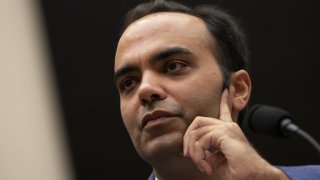
- The Consumer Financial Protection Bureau issued a request for information on Wednesday asking consumers for input on hidden and excessive fees from a range of lenders.
- The agency wants to know about "junk" fees associated with consumers' bank, credit union, prepaid or credit card account, mortgage, loan or payment transfers.
- The federal agency will use the information to target new rules, issue guidance to financial firms, and focus its supervisory and enforcement resources, it said.
The Consumer Financial Protection Bureau on Wednesday signaled a broad crackdown on hidden and excessive fees charged by banks, mortgage lenders and other financial entities.
The federal agency, created in the wake of the 2008 financial crisis, is seeking consumers' input on so-called junk fees associated with their bank, credit union, prepaid or credit card account, mortgage, loan or payment transfers.
Such experiences related to a product or service include: Fees people thought were covered by its baseline price; unexpected fees; fees that seemed too high; and fees where it was unclear why they were charged, according to the agency's announcement Wednesday.
Get New England news, weather forecasts and entertainment stories to your inbox. Sign up for NECN newsletters.
More from Personal Finance:
Millions of taxpayers still waiting on last year's tax refund
SEC chair eyes tougher cyber rules to protect investors against hackers
Aid Americans may get from a smaller Build Back Better
There's been an "explosion" in junk fees, such as overdraft fees charged by banks, late fees levied by credit-card companies, and closing fees when buying a home, CFPB Director Rohit Chopra said during a press call Wednesday morning.
"In many cases, junk fees act like penalties" instead of compensation for a legitimate service, according to Chopra, who was appointed by President Joe Biden. They also make it difficult for consumers to choose a product or service since they're unaware of its true cost upfront, Chopra said.
Money Report
The CFPB will use public comments to target new rules, issue guidance to firms, and focus its supervisory and enforcement resources, the agency said. The comment period ends March 31.
"Today, with our request for public comment on junk fees, we are beginning the process of ending banks' reliance on these exploitative income streams," making costs more transparent and perhaps saving American consumers billions of dollars, Chopra said.
Richard Hunt, the president and CEO of the Consumer Bankers Association, a trade group representing retail lenders, said the CFPB's initiative was an attempt to "fearmonger," calling it "fuzzy math at its best and political theater at its worst."
"The reality is, despite their claims to the contrary, overdraft fees as a percent of total revenue across the industry made up less than 2% in 2019," Hunt said in an emailed statement. "The Bureau has a responsibility to communicate with clarity and precision — not with overblown rhetoric to attack one industry."
Competition
Credit card companies earned $14 billion in "punitive" late fees in 2019, while banks earned $15 billion in overdraft and non-sufficient-funds fees, the CFPB estimates.
The initiative is also a response to Biden's call to spur more competition in the U.S. economy, according to Chopra, who framed high, inflated fees as an anti-competitive practice that has grown with industry consolidation.
"Capitalism without competition is — is not capitalism; it's exploitation," Biden said Monday at a meeting with the White House Competition Council.
Hunt pushed back on the notion of the banking industry being anti-competitive.
"The well-regulated, well-supervised banking industry is also among the most competitive in the world," he said. "Consumers benefit from the ability choose one of the nation's nearly 5,000 banks to meet their financial needs."
Some banks like Bank of America and Capital One have recently moved to eliminate or reduce overdraft fees on their own.
"This is progress, but it is not enough," Chopra said of some large banks adopting more consumer-friendly policies.
It's also somewhat unclear as to how effectively the CFPB will be able to regulate the fees that lenders charge. The public input will better help the agency target its efforts, according to a senior CFPB official speaking on background.
"We do have substantial authorities, rulemaking," the official said. "We're going to use our authorities as best we can."
The CFPB is also soliciting public feedback from small business owners, non-profit organizations, legal aid attorneys, academics and researchers, state and local government officials, and financial institutions, including small banks and credit unions, it said.
The agency also maintains a separate complaint database related to all financial products and services.






